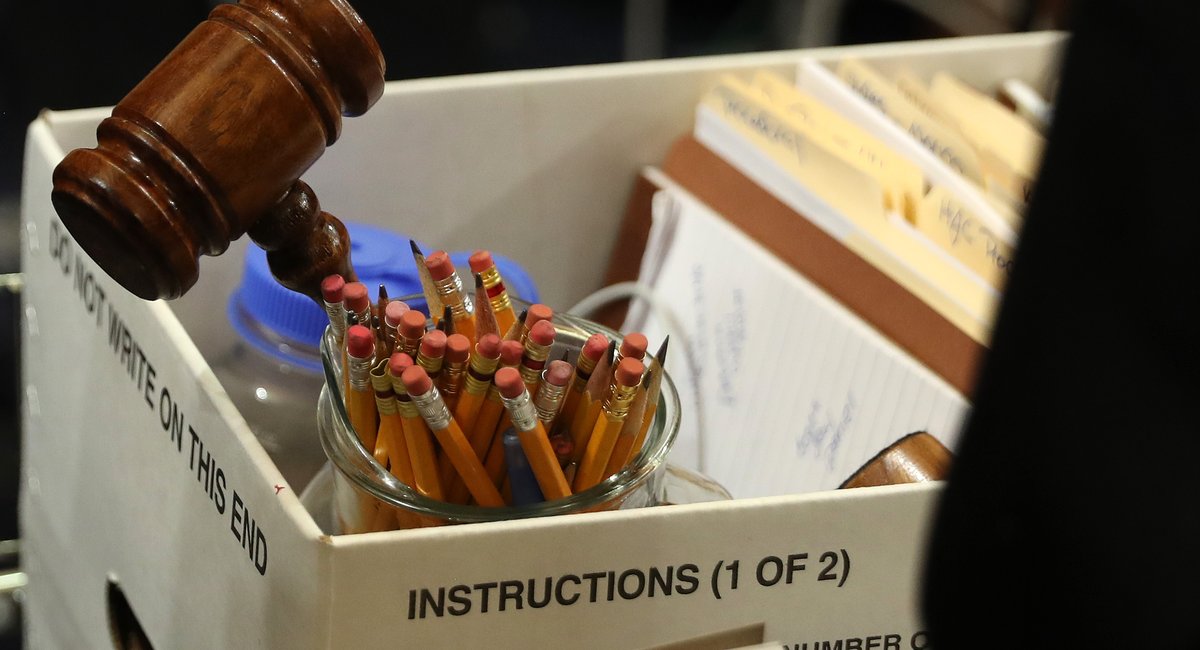In 2016, police pulled over Jahvon Mosquito, searched his car, and found what they said were forged credit cards in a small zippered wallet in the center console. After Mosquito’s arrest, his lawyer argued that police violated his rights when they searched the wallet and closely inspected the cards. But a judge disagreed, and the evidence was admitted at trial.
Mosquito’s case is one of hundreds that have been undermined or overturned after higher courts found lower court judges admitted evidence that never should have been used, according to a new report from the judicial transparency group Scrutinize, shared first with Gothamist.
The U.S. Constitution protects people from unlawful searches and seizures, which means police need to meet certain criteria before they can look through someone’s property or gather evidence, like drugs. But in more than 400 state cases since 2007, a trial court judge allowed prosecutors to use evidence that appellate judges later determined police had obtained illegally, the report found. In more than 150 cases, appellate judges dismissed the criminal case altogether, because there wasn’t enough lawfully gathered evidence to support the charges.
The analysis underscores the power judges hold as they preside over cases that are sometimes rooted in questionable evidence. The findings could also have implications for future criminal cases, especially as police stops increase under Mayor Eric Adams’ administration.
In Mosquito’s case, he was sentenced to three-and-a-half to seven years in prison after a jury convicted him of failing to stop at a stop sign, criminal possession of a forged instrument and unlawful marijuana possession, according to court records.
Scrutinize Executive Director Oded Oren said trial court judges are supposed to ensure that criminal cases don’t rely on evidence police collected illegally, so officers will be deterred from doing it again in the future. If judges don’t, he said, everyone’s constitutional rights are at risk.
“This impacts not only the individual defendants who were stopped or frisked or who had a confession coerced out of them,” said Oren, a former public defender. “It affects all of the civilians, all New Yorkers who live in that area and who are being policed by those officers.”
The report recommends that the state court system publish all trial court judges’ rulings on what evidence should be included in criminal cases, as well as transcripts of the hearings where prosecutors and defense attorneys argue over those decisions. It also asks the court system to release a yearly report on the numbers of such hearings and their outcomes.
The Office of Court Administration did not respond to a request for comment.
Researchers found that 212 state judges across New York allowed evidence to be used that appellate courts decided was gathered unlawfully. Appellate courts overturned the decisions of nearly 100 judges more than once. More than two dozen of those judges are still on the bench in New York state courts.
Oren said the appellate decisions suggest judges may have trusted police testimony even when officers lacked credibility because of an implicit bias in favor of law enforcement. Scrutinize’s report found two Queens judges who have faced allegations of pro-law enforcement bias allowed in evidence that appellate courts found was unconstitutionally obtained most often: Steven W. Paynter, who is now retired, and Michael B. Aloise, who still presides in Queens Supreme Court.
Between 2007 and 2023, appellate judges ruled against 18 of Paynter’s decisions to admit evidence, according to the report. The report cites a 2019 New York Law Journal article in which various attorneys, including now-Manhattan District Attorney Alvin Bragg, expressed concerns over Paynter’s record of admitting evidence that higher courts later found was collected illegally.
In one case, an appellate court unanimously ruled against Paynter’s decision to accept evidence from a car search that was used in a drug possession case. A detective testified in Paynter’s court that he had seen drug paraphernalia in the man’s car when looking in his rearview mirror. But the appellate judges noted that the detective’s description of the drug paraphernalia greatly differed from the description of another detective and found his testimony “strains credulity and defies common sense.” They dismissed the case, because they said there wasn’t enough legal evidence to prove the man’s guilt.
During the same time period, appellate judges ruled that Aloise permitted prosecutors to use illegally gathered evidence seven times.
Paynter and Aloise did not respond to voicemails requesting comment Friday. The Office of Court Administration did not respond to questions about whether it trains judges on potential biases toward law enforcement or criminal defendants.
